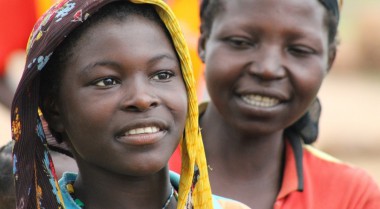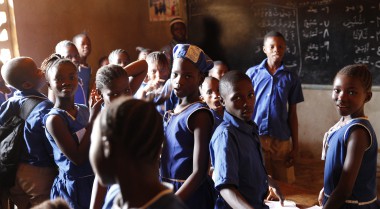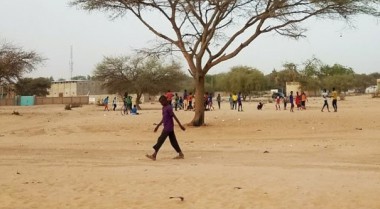
An Empowered and Robust Civil Society for an Inclusive Validation of Guinea Bissau Fragility Assessment
As part of the New Deal implementation and strengthening of civil society organizations (CSOs) role in Guinea-Bissau, Voz di Paz in collaboration with the Civil Society Platform for Peacebuilding and Statebuilding (CSPPS) organized a training workshop for Guinea Bissau civil society from 6 to 8 February 2017 at Hotel Lisboa, Bissau. The workshop, facilitated by Mr Georges Tshionza Mata (CSPPS DRC Focal Point and UNDP Consultant), aimed at (i) preparing civil society and ensuring its full participation in the New Deal process and (ii) consolidating its contribution into the process of the validation of Guinea Bissau Fragility Assessment report.
Mr. Mata further stressed the importance of dialogue, collaboration with government institutions, knowledge of instruments of power and exchanges with the community.
Training workshop
The civil society training workshop included key stakeholders including CSOs, government and UNDP. The Government was represented at the opening and closing sessions by His Excellency Mr. Ze Biai (Secretary of State in charge of Cooperation and Regional Integration), Mr. António Có (Government Focal Point) and the National Technical Team.
The workshop was organized in three steps: (i) Training of CSOs on the New Deal, its principles, processes and opportunities for civil society's participation in the development of a country; (ii) discussion on civil society inputs for the Validation of Guinea Bissau Fragility Assessment (2016); and (iii) the formation of a Civil Society Country Team for the CSPPS to actively participate in the implementation of the New Deal and in peacebuilding and statebuilding.
Mr. Georges Tshionza Mata commenced the training session by introducing tools that can support CSOs to effectively participate in the development of a country, these including but not limited to peaceful protests; Advocacy in the National Assembly to question budgets and expenditures in order to understand if there are deflections; Vigil in public spaces and the media. Mr. Mata further stressed the importance of dialogue, collaboration with government institutions, knowledge of instruments of power and exchanges with the community. This presentation was followed by the remarks of Mr António Có who had in turn spoken of the challenges related to resilience and sustainable development in the New Deal for Engagement in Fragile States.
Country Team Formation
At the end of the training workshop, CSO members met to discuss the composition of the CSPPS Country Team in Guinea Bissau. These discussions resulted in the establishment of a Country Team composed of five Civil Society Organizations. Among the five organizations is included a gender-based organization and a youth-oriented organization. According to Ms. Ude Faty, CSPPS Focal Point in Guinea Bissau, the training workshop for civil society was organized at a very strategic moment. This workshop, organized 4 days before the government workshop on the validation of Guinea Bissau Fragility Assessment, enabled Civil Society to strengthen its capacities and consolidate its contributions to the discussions (Workshop) on the results of the Fragility Assessment – Fragility Assessment Validation workshop was held on 10 February 2017.
CSPPS Support
It should be stressed that root causes of conflicts cannot be adequately identified without active participation and inclusion of civil society (local and rural) in the Fragility Assessment process. Since its inception, the Civil Society Platform (CSPPS) has supported the inclusion of civil society actors in Fragility Assessments and New Deal processes. Through CSPPS support, civil society in the g7+ member states has played an important role in the development of global Fragility Assessment process. A Fragility Assessment is a diagnostic tool that helps fragile and conflict-affected states identify the causes and characteristics of fragility and resilience in order to establish a transition towards stability and development. Ms. Faty explains that the Fragility Assessment is a step in the right direction in Guinea Bissau, but its results are to feed into the development of the National Development Plan in order to address key problems faced in-country and possible solutions.



